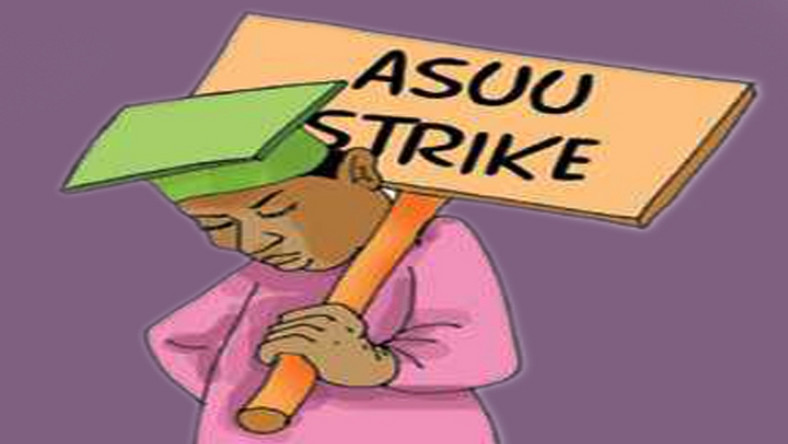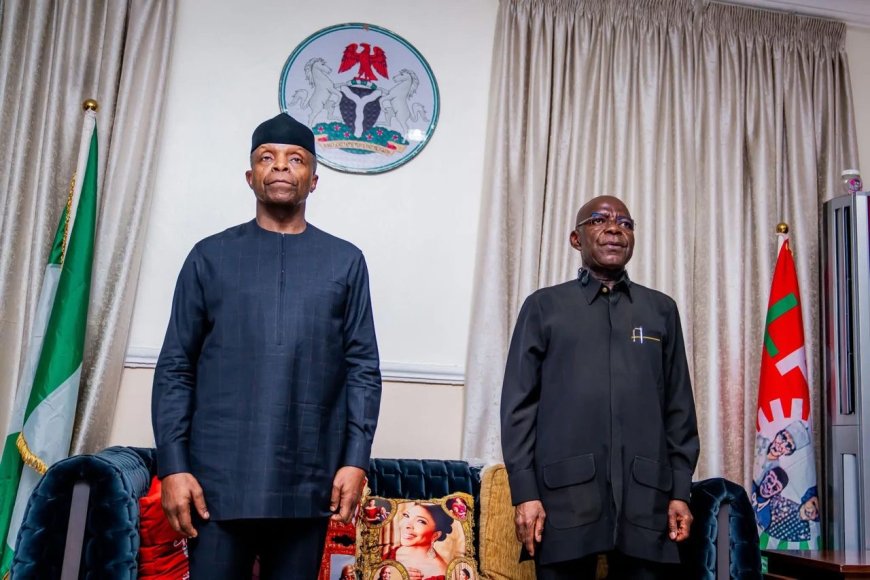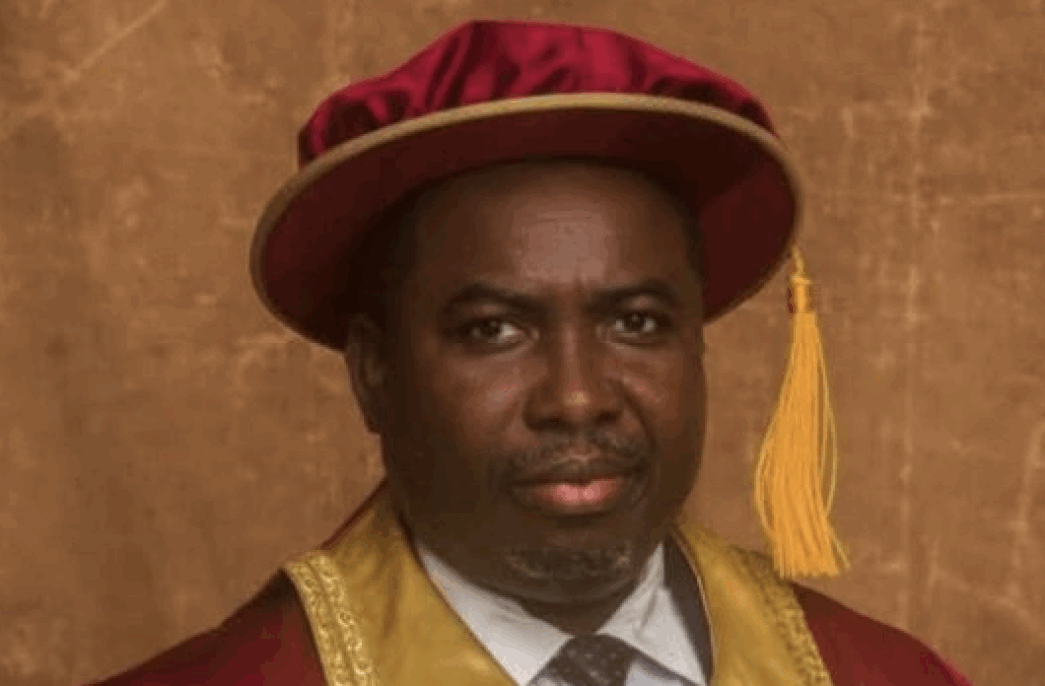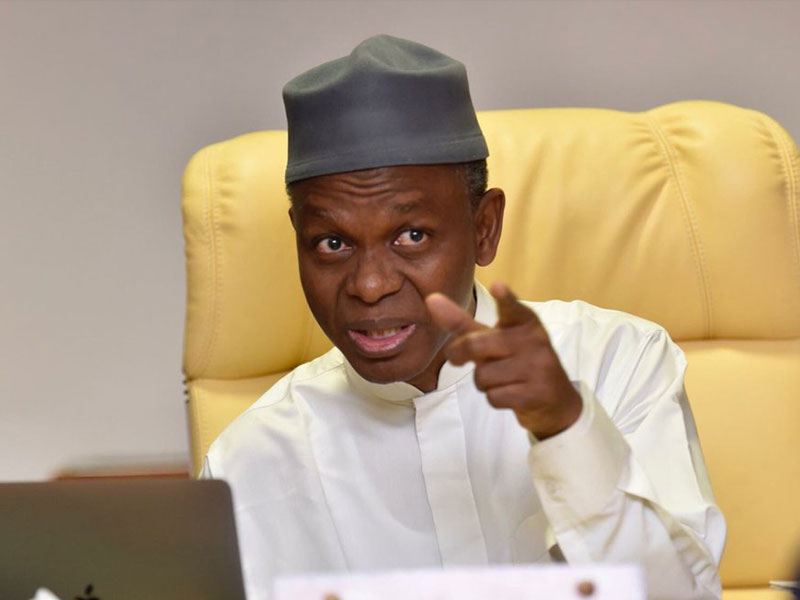Headlines
ASUU Declares Extension of Strike by Three Months

The Academic Staff Union of Universities has extende its ongoing strike for another three months.
A statement signed by ASUU president, Prof. Emmanuel Osodeke, said this was to give the government enough time to satisfactorily resolve all the outstanding issues.
It also stated that the roll-over strike was effective from 12.01 am, May 9, 2021.
ASUU said it took this decision after its National Executive Council meeting which started on Sunday night at the Comrade Festus Iyayi National Secretariat, University of Abuja.
The statement read, “After extensive deliberations, noting Government’s failure to live up to its responsibilities and speedily address all the issues raised in the 2020 FGN/ASUU Memorandum of Action (MoA) within the additional eight-week roll–over strike period declared on 14th March 2022, NEC resolved that the strike be rolled over for twelve weeks to give Government more time to satisfactorily resolve all the outstanding issues.
“The roll-over strike action is with effect from 12.01 a.m. on Monday, 9th May 2022.”
The press release titled, ‘Update on ASUU roll-over strike,’ read, “The National Executive Council (NEC) of the Academic Staff Union of Universities (ASUU) held an emergency meeting on Sunday, 8th May 2022 at the Comrade Festus Iyayi National Secretariat, University of Abuja, Abuja.
“The meeting was called to review developments since the Union declared an eight-week total and comprehensive roll-over strike action at the end of its emergency NEC meeting at the Comrade Festus Iyayi National Secretariat, University of Abuja, Abuja on 14th March, 2022. The strike action came on the heels of the Government’s failure to satisfactorily implement the Memorandum of Action (MoA) it signed with the Union in December 2020 on renegotiation of the 2009 FGN/ASUU Agreement, deployment of the University Transparency and Accountability Solution (UTAS), Earned Academic Allowances (EAA), funding for revitalization of public universities (both Federal and States), proliferation and governance issues in State Universities, promotion arrears, withheld salaries (owed for over 20 months in some cases), and Non-emittance of third-party deductions.”
It added that NEC noted with serious disappointment that the three-man Committee set up by the President and Commander-in-Chief of the Armed Forces of the Federal Republic of Nigeria on 1st February 2022 to resolve the lingering issues between ASUU and FGN had not called a single meeting to date.
“NEC was equally disappointed that ASUU’s only meeting with the Professor Nimi Briggs-led Renegotiation Committee did not reflect the expected level of understanding, preparation and clarity that undergird collective bargaining going by the Committee’s confession of “going about consulting stakeholders”. Unless urgent steps are taken to redirect the Committee on concluding a draft Agreement that has been pending since May 2021, its activities may end up as another wild goose chase,” it read.
ASUU NEC also condemned Federal Government’s cavalier attitude towards the strike action in the last twelve weeks, saying the government’s resort to the use of starvation as a weapon for breaking the collective resolve of ASUU members and undermine our patriotic struggle to reposition public universities in Nigeria was ill-advised and may prove counterproductive.
The statement said, “NEC was shocked that public universities have remained closed for about three months while members of the political class were busy purchasing expression of interest and nomination forms worth several millions of Naira in preparations for 2023 elections! Those in power turned their back on our degraded universities as they shuttle between Europe and America to celebrate the graduation of their children and wards from world class universities. This speaks volumes on the level of depravity, insensitivity, and irresponsibility of Nigeria’s opportunistic and parasitic political class.
“The result of the criminal neglect of education and gross mismanagement of the nation’s patrimony is evident in the collapse of the security architecture of our nation. Insecurity is getting worse by the day and spreading like the harmattan inferno in hitherto peaceful and secured parts of Nigeria, including university campuses. ASUU warns, once more, that unless something drastic is done to reverse these ugly trends, the country may be headed for a state of anarchy.
“NEC condemned the provocative statements of some government functionaries and salutes the Nigerian Labour Congress, patriotic students’ groups and civil society organisations who have taken steps towards resolving the current labour dispute with the Nigeria government.
However, Osodeke told our correspondent, that the union had yet to receive any notice of meeting from any Federal Government ministry.
Some of ASUU’s demands include the release of revitalisation funds for universities, renegotiation of the 2009 FGN/ASUU agreement, release of earned allowances for university lecturers, and deployment of the UTAS payment platform for the payment of salaries and allowances of university lecturers.
The Punch
Headlines
I’m Proud of You, Osinbajo Tells Abia Gov Alex Otti

Former Vice President Yemi Osinbajo has applauded Governor Alex Otti of Abia State for what he described as purposeful, people-centered leadership that is repositioning Abia State for sustainable growth and prosperity.
Speaking during his visit to the governor in his office on Wednesday, February 18, which coincided with Otti’s birthday, Osinbajo expressed deep appreciation for the governor’s hospitality and outstanding performance in office, noting that the true essence of public service is making meaningful differences on the lives of the people.
“I am extremely proud of the work you have done so far, you have lived up to expectations – not only to the people but also to your friends and associates. In the short time I have been here, I have seen tangible evidence of progress.” The former Vice President stated.
Prof. Osinbajo particularly commended Governor Otti’s bold social welfare reforms, including assenting into law, the Senior Citizens’ Law.
He described the initiatives as exemplary and deeply rooted in compassion and social responsibility, emphasising that the world’s most successful welfare systems are built on care for the vulnerable.
He also lauded the extensive road infrastructure renewal and improved connectivity across the State, describing the projects as visible symbols of purposeful and results-driven leadership. While reflecting on the demands of leadership, Prof. Osinbajo noted that while many aspire for public office, true distinction lies in delivery.
“Sometimes you wonder whether, after all the efforts to get into office, leaders are able to fulfill their promises. But in your case, you have done not just what you promised, but even more. You have made public service worthwhile,” Prof. Osinbajo added.
He prayed for renewed strength, wisdom, and divine favour for Governor Otti as he continues the work of transformation in Abia State.
In his response, Otti warmly welcomed Osinbajo, describing him as a brother, friend, and mentor, whose visit was deeply appreciated.
The governor clarified that the gathering was not a planned birthday celebration but just marking the day, noting that he rarely celebrate such occasions publicly, especially while serving in public office.
He expressed gratitude to well-wishers who came voluntarily and emphasised his preference for modesty and focus on service.
Otti thanked God for the progress recorded within 32 months in office, describing the administration’s achievements as modest but impactful.
He reiterated that governance must remain centered on the welfare and security of the people.
“Governance is about the people their welfare, their safety, and their peace of mind. If you enter office for any other reason, you miss the essence of leadership,” Governor Otti stated.
He recalled decisive actions taken in the administration’s first month, when some local governments were under the control of non-state actors. The governor said that firm intervention restored order and ensured that communities once inaccessible are now safe and open to residents.
Governor Otti also commended security agencies for their round-the-clock dedication, acknowledging their sacrifices in maintaining peace and stability across the state.
“We are grateful to the men and women who stay awake so that our people can sleep in peace,” Otti stated.
Earlier, the Secretary to the State Government, Dr. Emmanuel Meribole, on behalf of the State Executive Council, extended warm birthday wishes to the governor, praying for continued strength and fruitful years ahead.
Headlines
INEC Promises e-transmission of FCT Council Poll Results, Warns Against Vote-buying

Chairman of the Independent Electoral Commission (INEC), Prof Joash Amupitan, said on Wednesday that the results of the FCT Area Council Elections will be transmitted electronically to the INEC Result Viewing (IREV) portal in accordance with extant laws.
The INEC chairman also disclosed that about 1,680,315 registered voters will participate in Saturday’s Area Council Elections.
Speaking at a stakeholders meeting in Abuja, the INEC chairman said the commission will be deploying about 11,873 polling unit officials across the six Area Councils, warning however that the commission will not accept any excuse for failure.
He warned against vote buying during the elections, adding that the commission is working closely with the police and the Economic and Financial Crimes Commission (EFCC) to nip the incident in the bud.
“The conduct of credible elections is a shared responsibility. While the Commission is constitutionally mandated to organise, undertake and supervise elections, their success depends on the cooperation, restraint and commitment of all stakeholders acting within the framework of the law.
“This election will involve 1,680,315 registered voters who will cast their ballots in 2,822 polling units spread across the six Area Councils of the Federal Capital Territory, namely Abaji, Abuja Municipal Area Council, Bwari, Gwagwalada, Kuje and Kwali. A total of 570 candidates is contesting 68 constituencies for the positions of Chairmen and Vice-Chairmen as well as 62 councillorship seats, comprising 10 wards each in five Area Councils and 12 wards in the Abuja Municipal Area Council.
“These figures underscore the scale of the exercise and the responsibility placed upon all of us to ensure its success.
“It is important to note that the FCT Area Council Election remains the only local government election conducted by the Independent National Electoral Commission. Over the years, it has become a reference point for Local Government elections conducted by State Independent Electoral Commissions, particularly because of the diversity reflected in its outcomes.
“The credibility of this process has strengthened confidence in grassroots democracy. As we approach Saturday, 21st February 2026, we must collectively resolve to raise the bar even higher.
He said the Commission has kept faith with its commitments, and expect political parties and candidates to equally comply with the law as the campaign period draws to a close.
He affirmed that the distribution of Permanent Voter Cards ended on February 10, 2026. During the exercise, 106,099 PVCs from the Continuous Voter Registration exercise, which was suspended in the FCT on Sunday, 12th October 2025, were collected.
“This demonstrates the interest of residents of the Federal Capital Territory in participating in the electoral process. We encourage all registered voters who have collected their PVCs to turn out peacefully on Election Day and exercise their franchise in an orderly manner.
“Consistent with our commitment to transparency and inclusiveness, the Commission has accredited 89 domestic and foreign observer groups to observe the election. In addition, 700 journalists representing 72 domestic and foreign media organisations have been accredited to cover the process.
“We appreciate their role in strengthening public confidence and urge them to discharge their responsibilities professionally and in accordance with the applicable guidelines,” he added in a statement.
He disclosed that the commission will be deploying 11, 873 Polling Unit Officials, including officials for the 195 split polling units supported by 282 Supervisory Presiding Officers, 68 Local Government Area and Registration Area Supervisors and Monitors, 68 Registration Area Centre Managers, 208 Registration Area and LGA Technical Support Staff, as well as 192 Registration Area and LGA Collation Officers.
He said: “The emphasis throughout has been on strict adherence to the Electoral Act, the Commission’s Regulations and Guidelines, and on professionalism, neutrality and efficiency in the discharge of duties.
“The Bimodal Voter Accreditation System has been upgraded and will be deployed in all 2,822 polling units across the Federal Capital Territory for voter accreditation, and results will be uploaded to the INEC Result Viewing Portal in accordance with established procedures.
“All the required BVAS devices for the polling units, including those for the 195 split polling units, as well as the additional five per cent backup, have been thoroughly tested and fully charged for deployment on Election Day.
“To further strengthen public confidence, the Commission conducted a mock accreditation exercise using the improved BVAS in 289 polling units across the FCT. The outcome of that exercise was satisfactory, and we are confident in the effectiveness and reliability of the system for this election.
“Logistics remains central to the successful conduct of elections. On Monday, 16th February 2026, the Commission met with the leadership of the transport unions responsible for providing the bulk of vehicles required for election duty.
“For this election, 1,132 vehicles, 620 motorcycles and 14 boats will be deployed. We made it unequivocally clear that there must be no lapses in logistics on Election Day. Polling units are expected to open promptly at 8.30 a.m. We held extensive discussions and are confident that the unions will fulfil their obligations to ensure timely movement of personnel and materials.
“As we approach Election Day, the Commission has substantially discharged its responsibilities. What remains is for all stakeholders to play their part in ensuring that the election is peaceful, credible and that its outcome is widely accepted. Let me reiterate that INEC does not have a political party and does not have a preferred candidate.
“Our mandate is clear: to provide the enabling environment for residents of the Federal Capital Territory to freely choose their representatives on 21st February 2026. I call on candidates and party leaders to prevail on their supporters to act responsibly, respect the rules and allow the will of the people to prevail.
“There is, however, one issue that must be addressed directly, and that is vote trading or vote buying. The Commission has given an express mandate to the Economic and Financial Crimes Commission and the Independent Corrupt Practices and Other Related Offences Commission to deploy their personnel to polling units.
“Any individual found buying or selling votes will be apprehended and dealt with in accordance with the law. Vote trading undermines the sanctity of the ballot and erodes public confidence in democratic institutions. It must not be tolerated”.
He appealed to stakeholders to recommit themselves to peaceful conduct and strict compliance with the law, adding that security agencies must remain professional and impartial. Political parties must conduct themselves responsibly.
In addition, he said the media must report accurately. Observers must remain objective. Voters must turn out peacefully and exercise their franchise freely.
Headlines
DSS Arrests El-Rufai After Release from EFCC Custody

Former Kaduna State Governor, Nasir El-Rufai, was arrested by operatives of the Department of State Services, DSS, shortly after being released on bail by the Economic and Financial Crimes Commission (EFCC) according to Premium Times.
El-Rufai, who was granted bail at around 8 p.m., was immediately picked up by DSS operatives who reportedly lay in wait at the EFCC headquarters.
His arrest is reportedly linked to allegations that he unlawfully intercepted the phone communications of the National Security Adviser, NSA, Nuhu Ribadu.
The former governor, a prominent chieftain of the African Democratic Congress (ADC), had earlier honoured the EFCC’s invitation on Monday over alleged corruption linked to his administration.
He arrived at the EFCC headquarters accompanied by hundreds of his supporters.
This development comes after El-Rufai narrowly escaped arrest at Nnamdi Azikiwe International Airport, Abuja, last Thursday.
Following the airport incident, he accused NSA Nuhu Ribadu of orchestrating the attempted arrest in a series of interviews.
DailyPost






